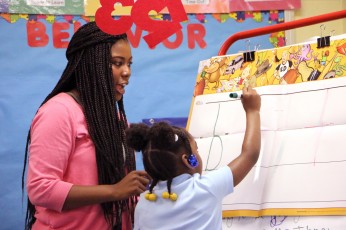



Chatoia Martin always wanted to teach, and after graduating from Rutgers University and volunteering with City Year in Baton Rouge, she began researching how to enter the profession. “I wanted to work in a community where I felt I was making a real change,” she remembered. “I wanted to feel great about my job, and for me that meant knowing what I was doing and that I was making a difference.”
A friend from City Year told her about an alternative teacher certification program called Urban Teachers. They both applied, were accepted, and moved to Baltimore.
Urban Teachers (formerly the Urban Teacher Center) was founded in September 2009 to train and certify highly effective teachers in Baltimore, Washington D.C., and, most recently, Dallas/Fort Worth. Its work is premised on the theory that selective admissions; rigorous, clinically based coursework; extensive experience in classrooms; ongoing support and coaching; and continual evaluation will result in more effective teachers who stay in urban schools.
“The quality of the classroom teacher is the most important factor that schools can control in providing quality education,” explains Urban Teachers founder and CEO Jennifer Green. “There is a mythology in the US that great teachers are idiosyncratic, random. But in places like Baltimore City where children are dealing with so much, working systematically on the quality of the teachers is imperative.”
At the core of Urban Teachers’ training is a yearlong residency in a classroom under the leadership of a master teacher. And it was a key attraction to would-be teachers like Chatoia. “I knew it would give me a year to grow and make mistakes,” she explained. “Other programs just give you a few weeks of training or put you straight in a classroom on your own.”
The data supports the value of this year of residency. After the residency year, one in four participants leave the program, with half leaving because they decide teaching isn’t for them and half because Urban Teachers decides it isn’t the right match.
“Not everyone should be a teacher,” Green argues, and this process allows people to understand that before they become responsible for a classroom full of children. Of those who successfully complete residency, 100% reported feeling prepared or very prepared to take on the role of full-time teacher.
The residency is only the first step in a four-year commitment to grow and develop as a skilled practitioner within a high-needs urban public school. During their first two years with the program, participants take masters’ level coursework through The Johns Hopkins University School of Education that integrates their clinical experiences in the classroom with the latest in education research and practice. “It’s not a program that gives you easy course work to maintain while you’re working full time with kids,” said Chatoia. “The coursework is hard, but once you understand that it’s a tool to guide your practice, it gets better. The assignments were something to focus on and reflect on and use to inform the next day’s work.”
In order to receive full certification, residents must pass through several gates, all tied to their ability to make a positive impact on student performance. They must successfully complete their Hopkins coursework, demonstrate professionalism, and effectively facilitate student academic success. Unique among teacher training programs, Urban Teachers will only certify a teacher who has demonstrated that he or she can improve student achievement, consistently implement effective teaching practices, and reflect an openness to continuous improvement.
Urban Teachers has 159 residents, teachers and alumni currently teaching in Baltimore City Public Schools with another 250 teaching in Washington DC. In Baltimore City, 52% of current residents are African American or Hispanic. Over three-quarters of first-year teachers returned as third-year teachers in 2016-2017.
The strong outcomes of Urban Teachers speak to the program’s overall effectiveness. Of those who persist in the program through the third year of teaching, nearly 100 percent meet the standards set forth in the Teacher Effectiveness Evaluation. And those effective teachers stay in Baltimore City; 85 percent of those who complete the four-year program remain teaching in City Schools beyond the program’s end. Because Urban Teachers produces high-quality teachers who stay, the demand for the program’s residents and teachers by the school district has outpaced the supply of incoming teachers.
The Abell Foundation salutes Urban Teachers for successfully recruiting, training, and certifying highly effective teachers committed to teaching in Baltimore City Public Schools.